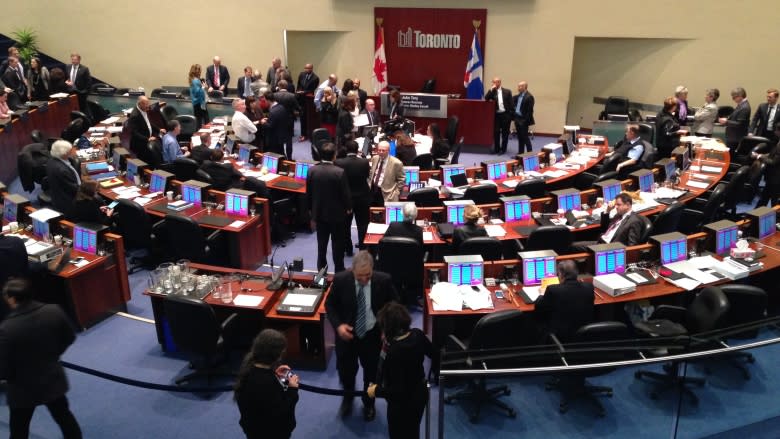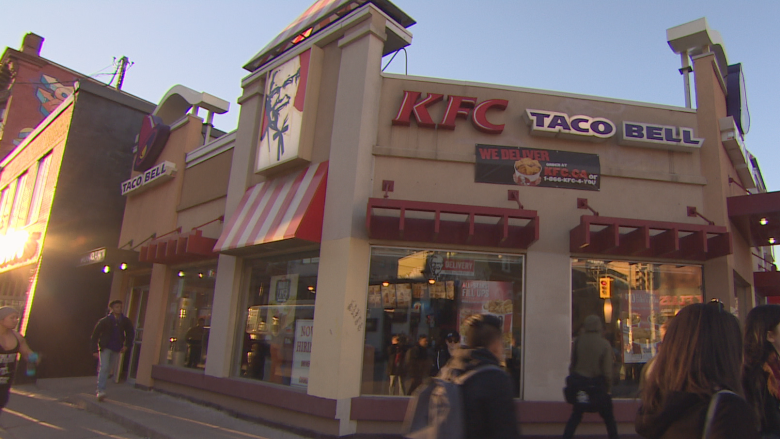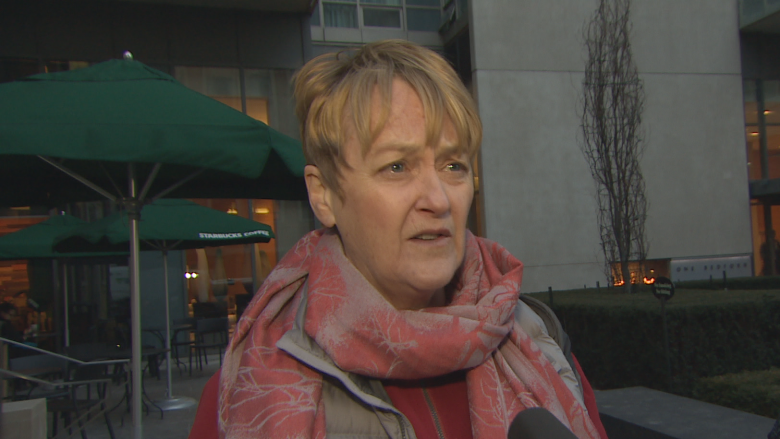Homeless man's 'tragic' death unrelated to shelter staff cuts, mayor's office says
The death of a homeless Indigenous man earlier this week was "tragic," but it's unrelated to last week's city budget vote to cut 10 front-line shelter staff, Mayor John Tory's office said in a statement.
The Sunday statement following a protest held by the Ontario Coalition Against Poverty (OCAP) outside his downtown condominium. The demonstration came just days after police said the 28-year-old man overdosed on heroin, believed laced with fentanyl, in the bathroom of a KFC in the Queen Street West and Bathurst Area.
Warren Albert, who knew the man, said he was there when it happened.
Albert said the man's death could have been prevented if he had access to a shelter where he could be given naloxone.
Albert, who has been living on the streets of Toronto off and on for the past six or seven years, said he was placing an order at the restaurant when a woman suddenly came out of the washroom pleading for someone to dial 911.
Shelter spots hard to get, homeless man says
"My friend's lips are turning blue," he recalled her saying.
The man had been in the washroom 10 minutes before the woman rushed out, Albert said.
So Albert ran over to the nearest pay phone and called for help. Not longer after, the man was dead.
Albert said that after all this time he knows how to take care of himself on the city's streets, but that it's not easy. Get to a shelter for dinner by 5 p.m. to secure a spot or they'll be gone, he said.
"I can survive. But I feel bad for the young people or the people just coming into being homeless."
During Wednesday night's city hall debate, Tory faced sharp questions over his support for a recommendation to cut shelter costs by eliminating 10 positions through attrition or redeployment. A motion by Coun. Joe Cressy to re-fund some $1 million to the shelter support budget failed by a vote of 19-25.
'Our shelter system is over capacity'
"Our shelter system is over capacity," Cressy warned council, adding the city's move to add shelter beds while reducing staff is akin to building a hospital without nurses.
Other councillors, including Jim Karygiannis, went further, saying Tory was jeopardizing the lives of homeless people across the city. Tory fired back, saying he had been assured this wouldn't put anyone at risk, and assuring council that the issue would be monitored by shelter staff in the coming months.
"If I believed this was the wrong thing to do, then I wouldn't support it," Tory fired back.
Shelter staff maintained that the man was not denied service but chose instead to leave the drop-in, according to the statement from Tory's office.
City staff are investigating the death and will request a full report when all the facts have been gathered, the statement said.
"On Wednesday night, the overall capacity of the men's shelter system was at 95 per cent. There were beds available, including 14 extreme cold weather beds at Fort York, which is at Bathurst and Front. Drop-in facilities provide tokens for people to get to shelters, but it is our understanding that the individual declined a referral," the statement continued.
It went on to cite a $185-million investment into poverty reduction initiatives and some 290 beds that will become available through the new budget.
That's not enough for OCAP organizer John Clarke, who wants to see Toronto open its two armouries for emergency use by the city's homeless.
A petition launched in December to open the armouries at Fort York and Moss Park garnered more than 3,100 signatures.
'I don't want to see someone die like that again'
"The simple truth is that we're in a city that's dripping with wealth, and for such neglect of people who are homeless to take place is absolutely unconscionable," Clarke said at a memorial for the 28-year-old outside Tory's home.
Street nurse Cathy Crowe agreed, calling the cuts a "gross indecency and emergency."
In 2015, after the deaths of two homeless men during a cold snap in Toronto within a span of just 24 hours, Tory said any death of someone on the city's streets "is one too many."
Since then, Crowe said, there have been 87.
The day after after the 28-year-old's death, Albert says he visited a shelter on Queen Street West where he picked up a naloxone kit.
"I don't want to see someone die again like that in front of me. I felt really bad," he said.
For now, he's remembering the man as a talented singer and guitarist whose death should have been preventable.
"I really liked being around him," he said.




